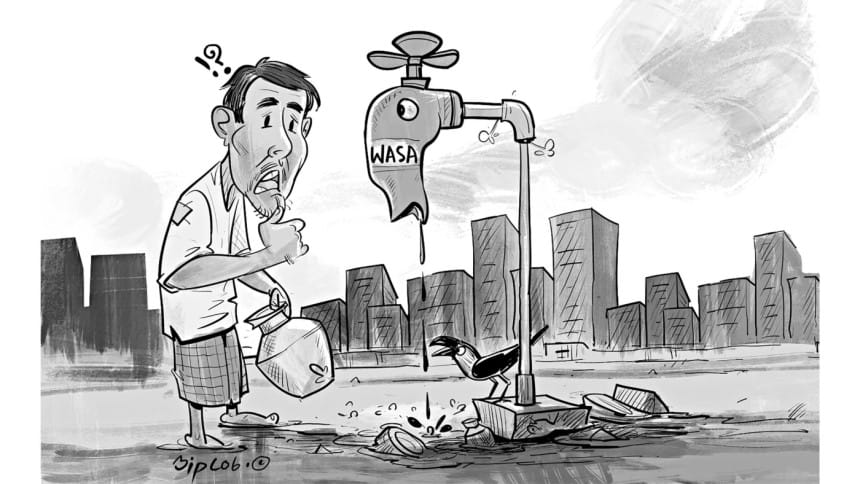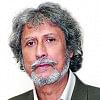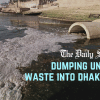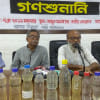Wasa water everywhere, not a drop to drink

Dhaka residents are scorched by a hot sun above their heads, their throats feeling like dry wood, and there is plenty of murky, smelly water all around, but alas! One cannot drink a drop of it! It reminds us of Coleridge's sailor who is dying of thirst, even though he is surrounded by a whole ocean.
Now, we know ocean water is salty and you cannot blame anyone for this, but why should we not be able to drink water supplied by the Dhaka Water Supply and Sewerage Authority (Wasa)? What's wrong with it? Wasa bosses loudly claim that there is nothing wrong in their water. They endure so much hassle to collect polluted water from far away rivers and supply the greenish thing to our homes with great care. Should we not be grateful that something resembling water comes out of the taps in our kitchens? We are always complaining, and this makes the water guy very angry. He has said he gets the same water at home and merrily drinks it, so the lesser humans like us must not keep complaining so often.
It appears that we, the beleaguered citizens, have no other option but to consume the foul-smelling water by the gallons until we become immune to the bacteria that live in it. And until that happens, maybe some of us—a thousand, perhaps—will have to go to hospital for the treatment of the worst kind of diarrhoea or cholera.
Interestingly enough, the claim by the Wasa boss of the safety of water supplied by his organisation takes a turn for the absurd when, in a recent "meet the press," he suggested everyone to boil the supplied water before drinking it. Now, does it not sound like pushing the ball into the court of the suffering citizens? Meaning, if we fail to boil the water and fall ill, he would blame us for it; "I told you to boil this water, but you didn't. So, it's not our fault anymore." One cannot help but wonder: If he is so confident that his water is safe to drink, why should he suggest boiling it?
As for the foul smell and the presence of harmful microorganisms, he blames it on the polluted water of the Shitalakkhya River, which, according to him, needs to be pretreated before it is finally treated at Sayedabad water treatment plant. Now, who would pretreat the river water? The consumers or Wasa? We already know that after the Buriganga, the water of Shitalakkhya is the most polluted. So the pertinent question is: Why is the polluted water of Shitalakkhya not pre-treated by Wasa?
The Wasa boss kept on defending his office in a recent dialogue with the press. Even though numerous laboratory tests confirmed the presence of various types of germs, including the ones that cause diarrhoea and cholera, Wasa denied this fact. It was perplexing to hear him say with such a show of confidence that no germs were found in Wasa water in 10 areas of the capital, from where most diarrhoea patients have visited various hospitals, including the International Centre for Diarrhoeal Disease Research, Bangladesh (icddr,b) in the past weeks.
The Wasa chief may have denied the presence of harmful germs or E. coli in the water collected from the pipelines and water tanks of city houses, but experts like senior microbiologists brush off his claim, terming it "baseless." They say that when a waterborne disease like diarrhoea breaks out in an area, one has to assume that a single source of water is causing the disease, and this gets confirmed after doing necessary laboratory tests.
The problem with some of our bureaucrats, technocrats and politicians is that they cannot accept inadequacies or failures with grace. Knowing very well that they are trying to hide facts behind clever words, they would go on denying things that are so blatantly visible to the world. Such an attitude does not help in removing the faults in the project and allow better ideas to be adopted for its success. The Wasa issue has been going on for decades, but the organisation's top bosses never acknowledged the fact that they could not deliver safe drinking water to the citizens.
One really cannot take chances with drinking water. Health issues are involved here, so it is expected that Dhaka Wasa, being the sole authority to supply piped water in the city, should show more respect to the rightful demand of the citizens. This organisation never hesitates to raise the price of its murky water, but does not do much to improve the water quality. One wonders what really goes on in its own laboratory—whether they have ever been able to find the harmful microorganisms floating under the microscopes.
This newspaper carried a number of reports and opinions on Dhaka Wasa since the present managing director took charge of it. In 2019, he faced huge public uproar for saying that Wasa water was 100 percent drinkable. He made the claim publicly as a rebuttal to allegations raised by the Transparency International Bangladesh (TIB). He had declared that people would be able to drink water straight from their taps by 2021. But, even in 2022, we continue to get contaminated water from them.
So, it seems like the Wasa conundrum will remain unresolved for many more years, until a more competent person is put at the helm.
Shahnoor Wahid is a senior journalist.

 For all latest news, follow The Daily Star's Google News channel.
For all latest news, follow The Daily Star's Google News channel. 








Comments